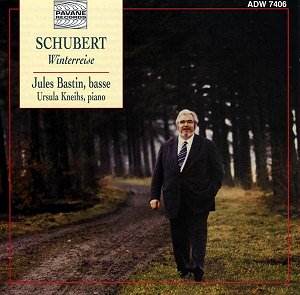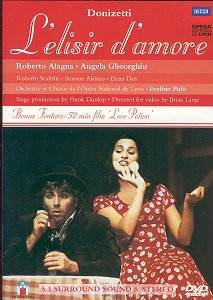
 Composer: Franz Schubert
Composer: Franz Schubert
Works: Winterreise D911
Performers: Jules Bastin (bass), Ursula Kneihs (piano)
Recording: Abbaye de Stavalot, France, 1978
Label: Pavane Records ADW 7406
Franz Schubert’s Winterreise, composed in 1827 to texts by Wilhelm Müller, stands as a monumental testament to the lieder tradition, encapsulating the profound psychological torment of a soul adrift in a desolate winter landscape. This song cycle, comprised of 24 songs, captures a young man’s journey through emotional desolation following the rejection of his love. The stark, chilling imagery of the lyrics juxtaposes with Schubert’s hauntingly beautiful melodies, creating an intricate tapestry that speaks not only to personal anguish but also to universal themes of loss and longing. As one of Schubert’s final works, Winterreise resonates with a depth that has drawn generations of interpreters to its compelling narrative.
Jules Bastin’s interpretation, accompanied by Ursula Kneihs, offers a blend of operatic poise and lyrical elegance. Bastin, a singer primarily known for his operatic prowess, brings a smoothness and richness to his bass voice that is immediately captivating. His technical capabilities—marked by a commendable legato and a nuanced diminuendo—enhance the lyrical beauty of Schubert’s melodies. However, the emotional depth required to convey the cycle’s darker undertones occasionally eludes him. For instance, in “Der Lindenbaum,” while his tone is beautifully shaded, the underlying sorrow and introspection of the text could benefit from a more visceral engagement. This is particularly notable when one considers the interpretative choices of singers like Dietrich Fischer-Dieskau, whose ability to evoke the raw emotional landscape of the cycle remains unparalleled.
Kneihs’s accompaniment is commendable, providing a sensitive and responsive foundation for Bastin’s voice. The piano’s clarity in the recording allows the intricate interplay between voice and instrument to shine through, particularly in moments like “Auf dem Flusse,” where the piano evokes the flowing water, echoing the protagonist’s own journey. The recording quality captures both the richness of Bastin’s voice and the crystalline textures of the piano, although the acoustic space, while slightly resonant, risks overshadowing the subtleties of the performance at times.
Evaluating this recording in the context of Winterreise’s storied discography, it may not ascend to the pantheon of legendary interpretations, such as Fischer-Dieskau’s celebrated 1967 recording with Jörg Demus, which embodies a complete fusion of dramatic narrative and vocal technique. Bastin’s approach, while undoubtedly enjoyable, offers a more polished yet less emotionally charged experience. For those who cherish the sound of a well-trained voice and appreciate the artistry of operatic singers venturing into lieder, this recording provides a satisfying listen. However, for listeners seeking the depth of emotional exploration that Winterreise demands, it may ultimately feel insufficient.
Bastin’s rendition of Winterreise showcases a commendable voice in a well-produced recording, yet it lacks the profound emotional engagement and interpretative weight found in the finest performances of this landmark work. As such, it serves as an intriguing entry point for listeners new to Schubert’s lieder but does not supplant the greats in the canon of Winterreise recordings.



